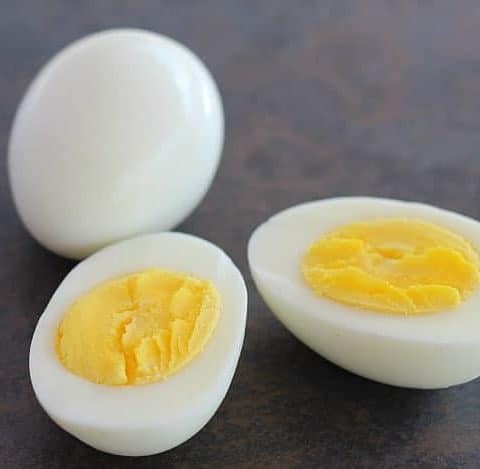Perfect Hard Boiled Eggs and The Secret to Easily Peeled Shells
Follow this method for perfect hard boiled eggs with shells that easily slip right off the egg. The written recipe is for 6 eggs but this method works for 1 egg or 12, as long as the pan is big enough the the eggs aren't overcrowded. They need to be able to fit in a single layer. Also, read the recipe notes before starting for important information.
Servings: 6
Calories: 63kcal
Ingredients
- 6 eggs, large eggs, chilled (right out of the refrigerator)
- 2 quarts rapidly boiling water, or enough to cover the eggs well
- ½ tsp white vinegar optional (see notes below)
Instructions
- Before beginning, please read the recipe notes for important tips and information.
- Fill a medium with 2 quarts water and heat on high till boiling. Slowly lower 6 eggs, one at a time, straight out of the fridge into the water, using a spoon to lower the eggs into the water. See note below regarding eggs that crack. Once you place the eggs in the boiling water, the boil will reduce since the eggs are cold. Keep at high heat until the water boils rapidly again and let boil for 30 seconds, then turn the heat to just a simmer. This requires keeping most burners set at medium since the cold-start eggs will dramatically drop the water temperature (the eggs will just kind of move around like jumping beans in the slow simmering water).
- Continue simmering, uncovered, in the pot for 13 minutes for hard boiled eggs (for soft boiled eggs, simmer for 6 1/2 minutes, for medium “jammy” eggs, 8 minutes).
- After the eggs have simmered for 13 minutes, place the pot in the sink and quickly run ice cold water over your eggs while draining out the hot water. Do this until only cold water is left in the pot. This will stop the eggs from cooking any further. Let the eggs sit in the cold water for 15 minutes to cool or refrigerate overnight. Tap the middle of the egg, tapping all around so it kind of has a "belt" of cracked shell, and then easily peel under cool running water. Whether you peel them right out of the pan or place eggs in the fridge and then peel the next day doesn’t matter. Either way, they peel easily. Don't rush or skip the cold water step, this is the step that ensures the eggs peel easily.
Notes
- Hard boiling large quantities- The quantity of eggs for this method doesn't really matter as long as you use a pan large enough for all the eggs to fit in one layer and you don't want them too crowded. The water needs to be enough to fully cover the eggs while they're boiling and simmering. I add enough to cover the eggs by about an inch. I've used this method with 12 eggs at one time with success.
- Help! My eggs cracked when they hit the water! Once in a while, an egg might crack when it’s placed in the boiling water. This usually happens if your egg has a thinner or delicate shell. To prevent egg from oozing out of the shell, add about 1/2 teaspoon white vinegar to the water before heating to boil. When I do this, the cracked egg cooks perfectly just like all the others in the pot.
- How hard to boil the water during cooking-Placing the egg directly into boiling water will help the shell separate from the eggs sooner, but you must turn the heat down to the simmer if you want your egg whites to be tender and not rubbery.This may require you to adjust the dial up or down a bit in the first few minutes until you’re sure the simmer will continue.
Nutrition
Serving: 1Egg | Calories: 63kcal | Carbohydrates: 1g | Protein: 6g | Fat: 4g | Saturated Fat: 1g | Cholesterol: 164mg | Sodium: 62mg | Potassium: 61mg | Sugar: 1g | Vitamin A: 238IU | Calcium: 25mg | Iron: 1mg
